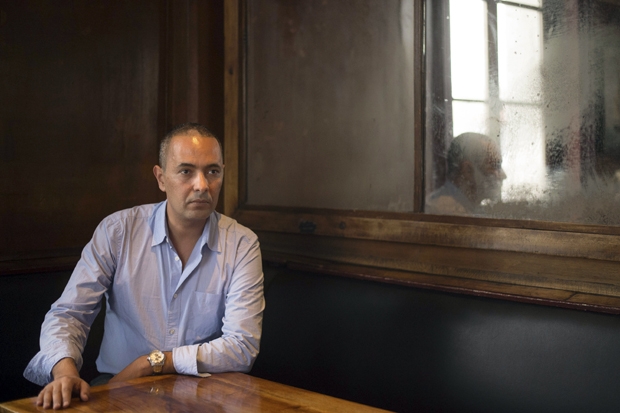In 1975 the Nigerian novelist Chinua Achebe, in a lecture at the University of Massachusetts, identified Joseph Conrad’s Heart of Darkness as the work of a racist. Achebe objected to a story that used Africa as a setting for ‘the break-up of one petty European mind’, and depicted Africans as nameless savages. Achebe’s lecture — a masterpiece of special pleading, false analysis and anachronism — is now established as a founding text in the post-colonial school of criticism.
On reading the cover blurb for The Meursault Investigation, one might have the impression that in this debut novel, Kamel Daoud, a native of Oran, has carried out a similar assault on Albert Camus’s first novel, L’Etranger (translated as The Outsider). In it Camus told the story of a young Frenchman, Meursault, who killed an Arab for no good reason on the beach in his home town of Oran, and was duly executed for murder. The book, published in 1942 during the wartime Occupation, made Camus’s reputation. But throughout the story Meursault’s victim remains nameless. He is always referred to as ‘the Arab’, identified merely as one of a group of natives who hold a grudge against Raymond, a friend of Meursault’s.
In The Meursault Investigation, short-listed for the Prix Goncourt in 2014, Daoud sets out to retell the story of ‘the Arab’s’ death. His narrator is the dead man’s brother and his purpose is to re-establish the corpse’s humanity and to avenge his family for the indignity of the life he and his mother have been forced to lead in the shadow of a masterpiece. He names his brother.
The murderer had a name. Whereas my brother [who] died in a book only had the name of an incident. [The author] could have called him ‘Two p.m.’ like that other writer who called his black man ‘Friday’.
We learn that he was called ‘Musa’.
There are echoes and deliberate mis-quotations from L’Etranger throughout The Meursault Investigation, starting with the opening sentence, ‘Mother is still alive today’. The picture of the narrator’s life in modern Oran is grim. Things have deteriorated since the first years of independence. People’s existence is characterised by ‘extreme idleness’; the narrator has the impression that they are all ‘going around in circles’. In the countryside the cypress trees are dying, the fields are abandoned, new houses are unfinished. Oran has become a town where men and women no longer feel free to embrace in public, where the local imam, whom the narrator loathes, ‘looks at his flock as if he’s the steward of some kingdom’.
Neither Conrad not Camus wrote the book that their post-colonial critics — with 70 years of hindsight — thought they should have written. But that is the way of good novelists. They will insist on writing the book that they have it in them to write. And perhaps because The Meursault Investigation is an accomplished work of fiction, the anger of Daoud’s hero convinces where Achebe’s infuriated protests failed.
In his introduction to the first English edition of The Outsider, Cyril Connolly noted that Camus was ‘an Algerian’ — that is, ‘not a French colonial, but a citizen of France domiciled in North Africa’, a member of ‘a pagan and barrenly philistine culture’. And Meursault’s explanation for his crime was identified by Jean-Paul Sartre as an exercise in ‘the philosophy of the absurd’. The young man’s detachment from normal human feelings led to the murder, and followed his realisation that in a world without God human activities and feelings lack any significant meaning, and are therefore ‘absurd’.
The Meursault Investigation has been described as a rejection of Camus’ achievement; a post-colonial reading of a masterpiece that was flawed by its insensibility to the suffering of the great majority of the people living in French Algeria. It works better when read as a bitter commentary on the tormented nature of the ongoing Franco-Algerian relationship. And oddly, with its disillusioned picture of post-colonial Oran, it echoes, rather than diminishes, Camus. In the gap between the legitimate aspirations of independence and post-colonial reality, and in the chilly detachment of Musa’s brother as he sets out to avenge his family’s honour, there is an updated aspect of ‘the absurd’.






Comments